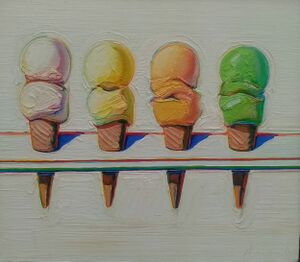Freedom
Chapter 1 - Worldview
Previous page: Ethics - Freedom - Next page: Responsibility
Back to Book content or directly to Main Page
.
Welcome to the Freedom page
.
Beyond choice
Generating behavioural alternatives isn’t the same as choosing, but it’s a necessary condition for agency. For us, humans, ‘free’ choice is typically effortful,
- involving the conscious contemplation of imagined future scenarios based on past experience
- It demands an ability to construct an image of the self within our environment: a ‘rich cognitive representation’ that allows those scenarios to be imagined in sufficient detail to reliably predict outcomes
- It also requires an ability to maintain a focus on our goal in the face of distractions and disturbances
| Content source |
|---|
| Philip Ball - Aeon 2020 |
.
Being human
| Einstein in "The world as I see it' - Alice Calaprice, The New Quotable Einstein (Princeton: Princeton University Press, 2005) |
|---|
| A human being is part of the whole called by us ‘universe,’ a part limited in time and space. We experience ourselves, our thoughts and feelings as something separate from the rest. A kind of optical delusion of consciousness. This delusion is a kind of prison for us, restricting us to our personal desires and to affection for a few persons nearest to us. Our task must be to free ourselves from the prison by widening our circle of compassion to embrace all living creatures and the whole of nature in its beauty…. The true value of a human being is determined primarily by the measure and the sense in which they have obtained liberation from the self… . We shall require a substantially new manner of thinking if humanity is to survive. |
.
Core ideas
.
Free will and the reference to human dimensions
Free will as self-realisation (Interests)
An act of free will is an act that expresses what the acting person himself finds important. To have free will, he must have his own opinion about what is important to him and what is not. By free will, we mean the ability to make decisions based on your own opinion.
.
Free will as a condition of responsibility (Values)
An action of free will is an action for which you are morally responsible. If you do not act out of free will, then you are not responsible for that action. By ‘free will’, we mean the kind of control over your own behaviour required for responsibility.
.
Free will as conscious control (Goals)
An action of free will is an action controlled by a conscious thought that you have just before the action. You act of free will when your action results from the fact that you thought: ‘And now I am going to do this.’ By ‘free will’, we mean the ability to consciously set your body in motion.
.
.
Isaiah Berlin's ‘Two Concepts of Liberty’
The idea of distinguishing between a negative and a positive sense of the term ‘liberty’ goes back at least to Kant, and was examined and defended in depth by Isaiah Berlin in the 1950s and ’60s. Negative liberty is the absence of obstacles, barriers or constraints. One has negative liberty to the extent that actions are available to one in this negative sense. Positive liberty is the possibility of acting — or the fact of acting — in such a way as to take control of one’s life and realize one’s fundamental purposes.
.
Negative liberty
The concept of negative freedom centres on freedom from interference. This type of account of freedom is usually put forward in response to the following sort of question: What is the area within which the subject – a person or group of persons – is or should be left to do or be what he is able to do or be, without interference by other persons? You restrict my negative freedom when you restrict the number of choices I can make about my life. The extent of my negative freedom is determined by how many possible choices lie open to me, or, to use one of Berlin's metaphors, how many doors are unlocked. Other people limit our freedom by what they do.
.
Positive liberty
Positive freedom is a more difficult notion to grasp than negative. Put simply it is freedom to do something rather than freedom from interference. From this it should be clear that the notion of positive liberty may rely on the belief that the self can be split into a higher and a lower self, and that the higher or rational self's priorities should be encouraged to overcome the lower, less rational self's inclinations: the passing desires that if acted on can so upset a life plan. The higher self has desires for what will make the individual's life go well; it wishes to pursue worthwhile and noble goals.
| Content sources |
|---|
| https://www.open.edu/openlearn/mod/oucontent/view.php?printable=1&id=1747 |
| https://plato.stanford.edu/entries/liberty-positive-negative/ |
.
.
The free will paradox
'Conscious control', what we think we experience most strongly as freedom as 'an action controlled by a conscious thought that you have just before the action', is now generally accepted by science as an illusion of our brain. Self-realisation and responsibility are deeply intertwined with the 'subconscious'. We often say we don't have influence over it.
.

